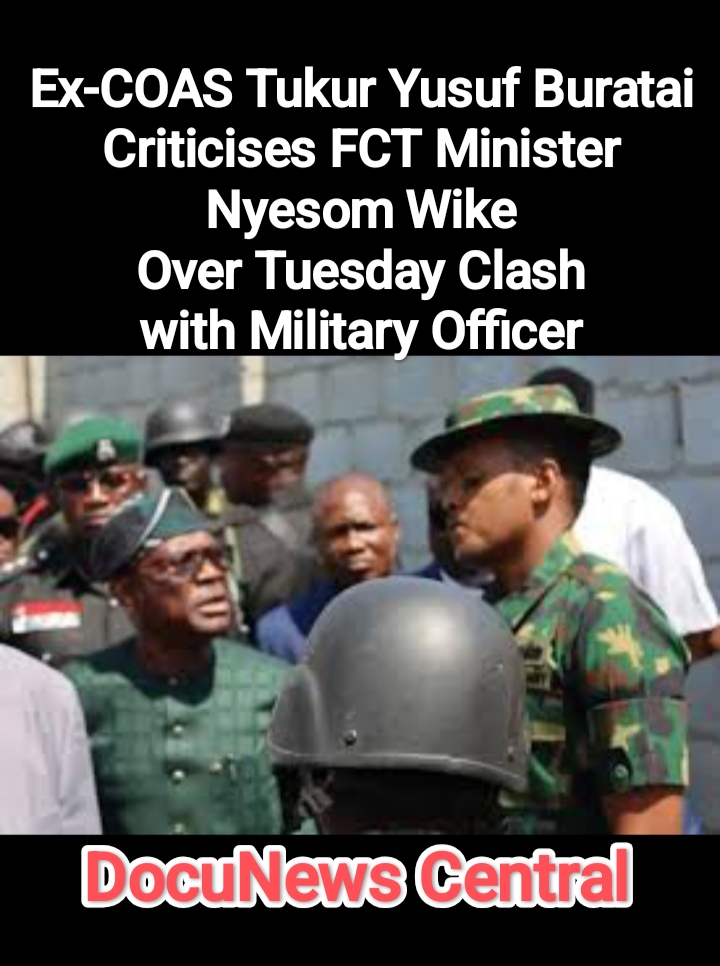
Former Chief of Army Staff Tukur Yusuf Buratai has publicly condemned the confrontation between FCT Minister Nyesom Wike and a uniformed military officer in Abuja. The incident, which occurred on Tuesday, 11 November 2025, involved a disputed piece of land in the Gaduwa district and quickly escalated into a verbal clash captured on video. Buratai described the minister’s actions as “more than political theatre” and a “reckless endangerment of national order,” warning that such behavior could undermine national discipline.
Details of the Clash
According to reports, Minister Wike visited the site with officials from the Federal Capital Development Authority (FCDA) to halt what he described as unauthorized developments. During the visit, he confronted a military officer assigned to secure the property. The confrontation was tense, drawing attention from local residents and staff, and the video circulated widely across social media platforms. The incident immediately became a topic of national discussion.
For context on similar security and federal property disputes, see our coverage of the Kidnapping of Defence Directors, which highlights security risks and government interactions with military officers.
Buratai’s Strong Response
Buratai emphasized that Wike’s public confrontation with a uniformed officer undermines the authority of the Commander-in-Chief and the Nigerian Armed Forces. He warned that such actions, if ignored, could set dangerous precedents for other public officials. According to Buratai, ministers and other government officials must maintain proper protocol, especially when interacting with members of the military.
Buratai’s statement has drawn comparisons to other cases of political recklessness. For example, see our recent article on Ortom’s Call for US Help Against Terrorists, which illustrates the consequences of political figures taking actions that compromise security and national order.
The National Security Perspective
Experts argue that public officials should avoid direct confrontations with uniformed officers to prevent erosion of authority and morale within the armed forces. The incident involving Wike could have broader implications for civil-military relations. Analysts warn that allowing political leaders to verbally challenge security personnel in public could weaken discipline and encourage disrespect for authority.
Furthermore, the clash raises questions about land administration and governance in the FCT. When ministers intervene personally in disputes involving federal property, the risk of escalation increases. This is not only a matter of protocol but also a concern for the security and stability of government operations.
Buratai’s Recommendations
Buratai called on Wike to issue an immediate and unequivocal public apology to President Bola Ahmed Tinubu, the Nigerian Armed Forces, and the officer involved. He also urged the federal government to treat the incident as a matter of national security rather than a simple land dispute. Such a response, he said, would help restore order and maintain the integrity of the military chain of command.
For readers interested in further context on Wike’s interactions with security forces, see our post More Trouble for Wike, which details other controversial actions by the FCT Minister in Abuja.
Public Reaction
The video of the clash went viral within hours, drawing thousands of comments on social media. Many Nigerians expressed concern about the minister’s behavior and the potential implications for national security. Some commentators defended Wike, arguing that he was protecting federal property, while others criticized him for challenging a uniformed officer publicly, which they saw as reckless and disrespectful.
This debate mirrors public concerns raised in other high-profile cases, such as the recent Ortom controversy, where government actions had direct consequences for national security and public perception. These examples highlight the importance of measured and responsible behavior by political leaders.
Why This Matters
- The clash underscores the delicate relationship between civil authorities and the military chain of command in Nigeria.
- It raises concerns about morale and discipline among uniformed officers when political leaders publicly challenge them.
- The incident highlights broader governance and land management challenges in the FCT.
- It sets a precedent for how political leaders engage with security agencies in high-stakes situations.
- The clash has generated widespread public discussion about respect for authority and the role of government officials in national security matters.
Potential Implications
If Wike does not issue an apology or if the federal government does not respond, the incident could escalate tensions between civil authorities and the military. Analysts suggest that it might affect the operational efficiency of officers tasked with protecting federal property and maintaining law and order. Maintaining protocol is critical to avoid undermining the chain of command, which is essential for national security.
The incident also raises questions about accountability and transparency in governance. Public officials are expected to act within the law and respect institutional boundaries. Any deviation can have long-lasting effects on public trust and institutional credibility.
Next Steps
As of now, Minister Wike has not publicly responded to Buratai’s call for an apology. Observers are closely monitoring the federal government’s next move. The Presidency and Ministry of Defence may issue statements or directives to prevent similar incidents in the future.
Given the national attention, this incident may influence future civil-military relations, particularly in the FCT. It also serves as a reminder for public officials about the importance of respecting protocol when interacting with security personnel. for more verified news like ours go to http://legit.com
Conclusion
The clash between Wike and the military officer serves as a critical lesson on discipline, governance, and the importance of protocol. Public officials must carefully balance authority and responsibility, especially when interacting with the armed forces. Buratai’s warnings highlight that recklessness can have serious implications for national security, public perception, and institutional morale.
For more insights into federal authority and security matters, readers can also refer to Kidnapping of Defence Directors, which underscores the risks involved when government officials engage directly in sensitive security matters.











Your point of view caught my eye and was very interesting. Thanks. I have a question for you.
Your point of view caught my eye and was very interesting. Thanks. I have a question for you.